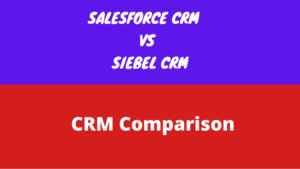For businesses, both large and small, Customer Relationship Management (CRM) testing is a crucial step before implementing any modifications. It is vital to verify the CRM system in both production and staging environments according to specific specifications. Let’s delve into CRM testing and explore the numerous benefits it offers.
What is CRM Testing?
CRM stands for Customer Relationship Management, and CRM testing involves a series of procedures and methods used by developers to ensure seamless communication between various applications. Once the CRM system is complete, it becomes essential to optimize the interface, providing a scalable, reliable, and secure connectivity solution for every platform.
The significance of CRM testing lies in its ability to identify bugs and critical flaws in the early stages. In this process, the CRM system receives requests and provides feedback or responses over the internet, using protocols like SMTP and HTTP.
Also read: Salesforce CRM vs Siebel CRM
Benefits of CRM Testing
Let’s explore the advantages of CRM testing during the software development process.
#1 – Cost-Effectiveness
CRM tests can be conducted before the Graphical User Interface (GUI) testing, enabling testers to identify defects early on. Addressing issues in the initial stages reduces the likelihood of extensive application changes. By identifying and resolving problems before reaching the production phase, QA testers significantly reduce costs.
#2 – Time Efficiency
Automated CRM tests deliver faster and more effective results, optimizing development workflows. It improves the feedback loop, allowing quicker issue identification. Compared to User Interface (UI) tests, CRM tests take less time, providing saved time that can be used for reviewing and enhancing overall performance through automation testing.
#3 – Comprehensive Coverage
The CRM testing process comprehensively analyzes each layer to deliver the best user experience. It ensures that databases communicate seamlessly with each other, eliminating hindrances. This comprehensive approach improves overall software quality, meeting user expectations.
#4 – Enhanced Stability
Unlike the GUI, the CRM interfaces remain more stable. This stability arises from the detailed information in the CRM system, making any necessary adjustments apparent to QA testers. Consequently, the CRM system remains robust and stable.
#5 – Reduced Maintenance Efforts
CRM layers exhibit significant stability with infrequent changes. New releases or merges rarely impact CRM performance. This results in reduced maintenance efforts for CRM testing.
#6 – UI-independent Access
A notable advantage of CRM testing is its ability to access the application without relying on a user interface. Testers can run CRM tests without experiencing software performance directly. This grants QA engineers detailed information about errors and defects, facilitating faster resolutions.
#7 – Broad Language Compatibility
CRM testing involves data exchange in JSON and XML formats, supporting a wide range of languages such as Java, JavaScript, Python, Ruby, PHP, etc. This versatility allows testers to choose the language they are most comfortable with for CRM testing.
Features of CRM Testing Tools
The following features are essential in CRM testing tools:
– AssertJ support for creating better assertions.
– Support for SOAP requests, REST, and SSL certifications.
– Test import capability from WSDL, Postman, WADL, and Swagger (2.0 and 3.0).
– A built-in platform for creating centralized activities and reports across various tool stacks.
– Integration with CD/CI tools like DevOps, Jenkins, CircleCI, Azure, etc.
– Efficiently increases test cycles for QA teams to complete within specific timeframes.
– Reduces testing time through automated processes.
Different Types of CRM Testing Techniques
Various CRM testing techniques to be aware of include:
1. Load Testing: Measures how the CRM system handles a massive amount of requests in less time.
2. Penetration Testing: Analyzes potential threats by simulating attacks from a third-party perspective.
3. Fuzz Testing: Sends random requests to interpret how the CRM system responds to crashes and errors, ensuring protection against potential threats.
Also read:- The Economy Does Not Need Regulation, It Needs Efficient Regulation
4. Security Testing: Determines the CRM system’s resistance to cybersecurity attacks.
5. Error Detection and Runtime Testing: Assesses execution errors, error detection, resource leaks, and monitoring.
Also read:- write for us tech
Also read:- Technology write for us
Also read:- write for us technology blogs
6. Validation Testing: Performed in later stages to verify CRM efficiency and behavior.
How to Perform CRM Testing?
Follow these essential steps for effective CRM testing:
1. Review API Specifications: Understand the purpose and functioning of the CRM system to strategize a successful testing plan.
2. Assess CRM Requirements: Identify target consumers, functions, features, and application workflows to evaluate CRM testing requirements.
3. Determine Input Parameters: Define essential parameters to judge if the CRM system performs its functions correctly.
4. Create Negative and Positive Tests: Conduct tests to ensure that the CRM system functions according to specifications under different scenarios.
5. Select CRM Testing Tools: Choose automated tools that align with the CRM testing process to streamline and expedite testing.
Conclusion
In conclusion, understanding CRM testing service and its benefits is vital for successful software development. The advantages mentioned above dispel doubts and highlight the importance of CRM testing service for efficient and reliable customer relationship management.
Author bio:
Hello, I am a professional SEO Expert & Write for us Technology blog and submit a guest posts on different platforms- we provides a good opportunity for content writers to submit guest posts on our website. We frequently highlight and tend to showcase guests.



